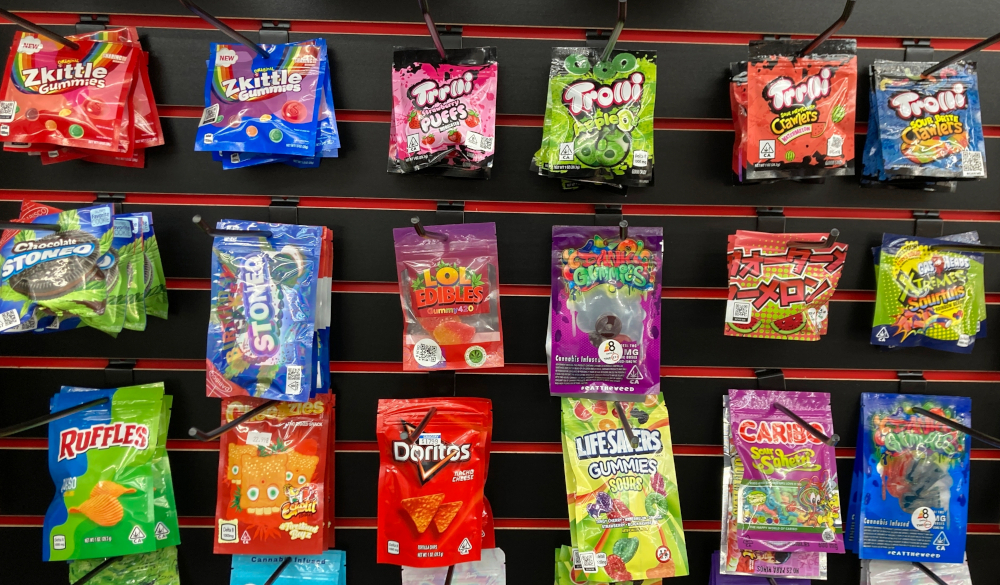Two states pressed ahead last week with crackdowns on products containing intoxicating hemp, making moves aimed at getting the illicit substances out of the market while sharply criticizing producers.
Governors in California and Missouri went the regulatory route as legislatures in both states have failed to pass laws to control the controversial products.
In California, Gov. Gavin Newsom proposed emergency regulations to combat “increasing health incidents related to illegal hemp products, which state regulators have found sold across the state, especially beverages and food products.”
“We’re taking action to close loopholes and increase enforcement to prevent children from accessing these dangerous hemp and cannabis products,” Newsom said in a statement issued Friday.
‘We’ve had enough’
“It’s a disgrace and it’s a shame and the (hemp) industry bears full responsibility for not policing itself for the proliferation of these intoxicating products that are hurting our children,” Newsom added during a news conference Friday morning. “We’ve had enough.”
Newsom said he was spurred to push harder for the regulations after his pre-teen son told him he had older friends who were “buying some stuff they shouldn’t be” from the grocery store. The governor said when he went to a store himself, he found intoxicating hemp beverages mixed in among non-intoxicating drinks.
The new rules would close loopholes that dodgy manufacturers in the hemp industry have exploited to offer products containing the “high”-producing substances in common retail outlets such as gas station convenience stores – often in packaging designed to attract youth.
The synthetic compounds are made by putting hemp-derived CBD through a process in the lab. In addition to drinks, the substances are sold in gummies and other snacks in packages that often resemble well-known brands. Consuming them can result in psychoactive responses in users, much like those produced by the delta-9 THC common in marijuana plants.
The California regulations will go into effect immediately after they are approved by the state Office of Administrative Law. State and local law enforcement and state regulatory agencies including the departments of Public Health, Cannabis Control, Alcoholic Beverage Control, and Tax and Fee Administration will immediately begin enforcing the new rules following that approval, and sellers will be required to pull noncompliant hemp products from their shelves.
No detectable cannabinoids
The regulatory action in California comes after a bill intended to crack down on the controversial products failed to get consideration in the state’s recently closed legislative session – leaving consumers at risk, according to state officials.
The California rules would require that edible hemp products contain no detectable levels of THC or other cannabinoids. Producers have concocted several highly concentrated psychoactive substances from hemp-derived CBD, such as delta-8 THC and delta-10 THC, THC-O-acetate, HHC, THCP.
In addition to containing no THC, hemp edibles may be sold only to consumers 21 and older, and packages of the products are limited to five servings.
‘A huge step’
Dr. Lynn Silver, senior advisor at the Public Health Institute, an Oakland-based independent nonprofit, told the Los Angeles Times that Newsome’s proposed regulations “represent tremendous progress in protecting children and teenagers.”
“The way things are now at present, a 10-year-old can walk into a vape shop and buy intoxicating products with more THC than legal edible cannabis products,” Silver said. “These regulations will be a huge step to fix that.”
The new rules are a response “to increasing health incidents related to illegal hemp products, which state regulators have found sold across the state, especially beverages and food products. Children are particularly at risk should they consume these products,” Newsom said in the Friday statement.
Raids start in Missouri
In Missouri, state regulators said they found intoxicating hemp products in 23 of 44 places of business hit with inspections last week after Gov. Mike Parson issued an executive order that all hemp-derived THC edibles and beverages be removed from store shelves.
The order directs regulators “to identify food that contains unregulated psychoactive cannabis products as deleterious, poisonous and adulterated.”
Nineteen of the 23 establishments found to be selling such products last week agreed to embargo and or discard the products in their possession, while four refused to take such action, according to Lisa Cox, a DHSS spokesperson.
When DHSS inspectors find illicit products, they issue immediate requests for voluntary compliance, including destruction of the products. If retailers do not comply, products will be held pending court orders for their destruction, DHSS said in to a memo recently issued to food retailers and wholesalers.
Cox said her agency has not yet taken court action regarding any of the cases uncovered so far.
Unscrupulous
The Missouri Hemp Trade Association filed a lawsuit Aug. 30 in Cole County Circuit Court to stop the governor’s ban on all intoxicating hemp food and drinks from taking effect Sept. 1.
The stakeholder group is relying on a strict interpretation of the 2018 U.S. Farm Bill that legalized industrial hemp and all downstream derivative products. At the time, intoxicating hemp products were not understood or envisioned by lawmakers – who therefore left a loophole that unscrupulous operators have taken advantage of to develop a whole new class of hemp-derived psychoactive cannabis compounds.
Failed legislation
Parson said his order is aimed primarily at companies that sell intoxicating hemp edibles that mimic popular treats and snacks. But hemp industry stakeholders argue the order could also spark a ban on other products that have gone through lab testing and are age-restricted to customers 21 and older.
The regulatory enforcement in Missouri also comes in the wake of failed legislation. Missouri lawmakers introduced several bills last year aimed at regulating or outright banning intoxicating hemp products. The proposed legislation typically sought to treat these products similarly to recreational marijuana, with restrictions on sales, age limits, and labeling requirements.
However, as of the most recent legislative sessions, no comprehensive statewide ban specifically targeting the substances has been passed into law.

